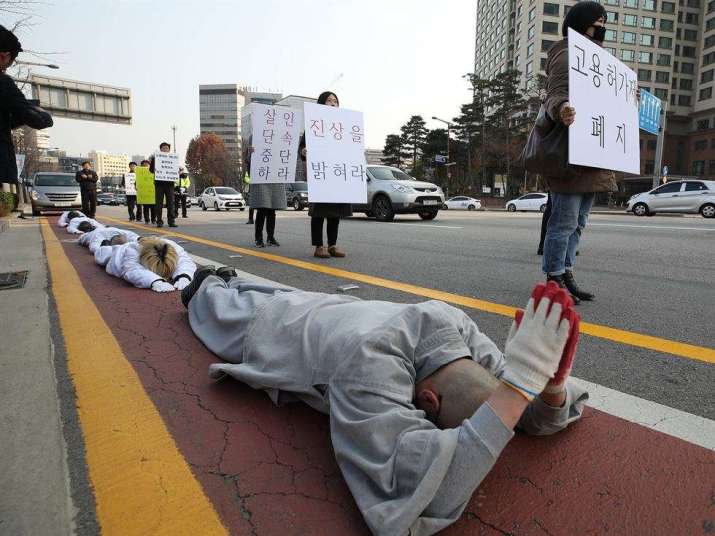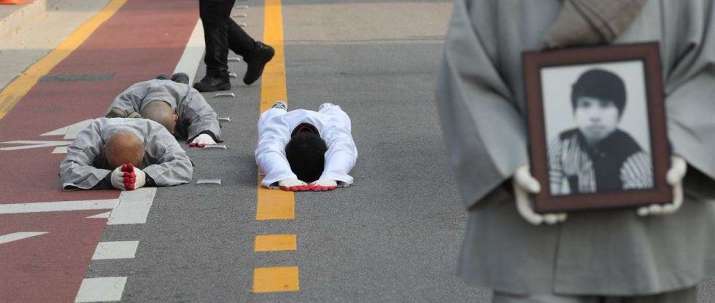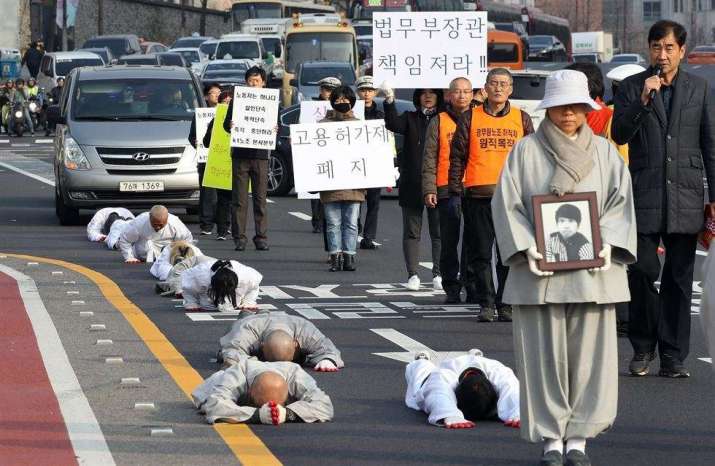NEWS
Buddhist Monks in Seoul Perform Ritual Prostration to Seek Justice for Dead Myanmar Worker
 Buddhist monks prostrate themselves in Seoul, calling for better treatment of illegal workers in Korea. From asianews.it
Buddhist monks prostrate themselves in Seoul, calling for better treatment of illegal workers in Korea. From asianews.itBuddhist monks of the Jogye Order of Korean Buddhism, South Korea’s largest Buddhist order, performed a rare exercise of ritual prostration last week, calling on the country’s government to re-open a police investigation into the death of a worker from Myanmar in September.
Accompanied by social activists on an almost two-kilometer slow march between Jogyesa, the Jogye Order headquarters in central Seoul, and the Cheong Wa Dae presidential residence (also known as the Blue House) on 19 November, the monks performed a ritual prostration in which the practitioner takes three steps before extending their entire body flat on the ground, ensuring that the forehead, palms, knees, and toes all make contact. The demonstrators were demanding that the authorities re-open the case of Than Zaw Htay, who fell to his death during a raid on a construction site by immigration officials who were looking for illegal immigrants.
The Jogye Order is a school of Seon (Zen) Buddhism that traces its roots back 1,200 years to the Unified Silla (also known as the Later Silla) kingdom (668–935). The Jogye school as a distinct entity emerged in the late 11th century when the monk Bojo Jinul, credited as the school’s founder, sought to combine Seon practices with the theological underpinnings of sutra-based Buddhist schools, including Korean Pure Land Buddhism. The order now represents the largest segment of South Korea’s Buddhist population, administering about 1,900 active temples and more than 13,000 monastics and 7 million lay followers nationwide.
The protestors said the 25-year-old construction worker fell eight meters while trying to flee the raid on 22 August. He was reported to have been working on an employment visa since 2013, although his visa had expired earlier this year. He died in hospital 13 days later.
According to a report in The Kyunghyang Shinmun newspaper, Than Zaw Htay’s coworkers testified that he fell after an immigration officer tried to grab his legs as he climbed through a window. The authorities have insisted that immigration officials followed legal procedures during the raid. A subsequent police investigation concluded that the officials were not responsible for the death and the case was closed.
 A monk bears a photo of Than Zaw Htay, who died in September. From asianews.it
A monk bears a photo of Than Zaw Htay, who died in September. From asianews.it“The government should trace an officer responsible for the death and punish in order to prevent deaths of migrant workers in the state raid,” Udaya Rai, head of the Migrants’ Trade Union, South Korea's first labor union for migrant workers, was quoted as saying. (UPI)
About 30 people joined the protest march demanding that the Justice Ministry re-open the investigation. They carried banners that read “Hold the Justice Minister Responsible” and "Abolish Employment Permit System,” describing the incident as a “murderous raid.” (UPI)
The demonstration was “our physical proclamation carrying our desperate request for the truth and intent for those responsible to be punished,” said Venerable Haechan, head of the Jogye Order’s social and labor committee, which organized the protest. He also described that the march as “our bodily gesture to demand a stop to this murderous raid in a ‘rabbit-herding’ style that has already killed 10 migrant workers, including the Myanmarese, in the past 10 years." (The Korea Times)
In September, the family of Than Zaw Htay agreed to donate his kidney and liver to two South Korean patients. “The father decided to donate his son’s organs when I told him about the family of another migrant worker who donated his organs to save four Korean lives,” said U Kyaw Naing Soe, Myanmar labour attaché in Seoul. (Myanmar Times)
Earlier this year, the family of 44-year-old Ko Win Htut Zaw, who suffered a fatal accident while working at a factory, donated his liver, heart, and kidneys to four South Korean patients. To memorialize the act, the Korean Association in Myanmar established the Ko Win Htut Zaw Scholarship Foundation in Myanmar in July to pay for the education of 21 students.
 About 30 monks and protestors held a demonstration between the Jogye Order headquarters and the presidential residence in Seoul. From asianews.it
About 30 monks and protestors held a demonstration between the Jogye Order headquarters and the presidential residence in Seoul. From asianews.itAccording to data from the 2015 national census, the majority of South Korea’s population—56.1 per cent—holds no religious affiliation. Christians make up the largest religious segment of the population at 27.6 per cent, while Buddhists account for 15.5 per cent.
See more
Prostrating monks call for truth in Myanmar worker's death (The Korea Times)
South Korean activists call state to reinvestigate death of Myanmar worker (UPI)
Buddhist monks perform three-steps-and-one-prostration-bow demanding justice for dead migrant (AsiaNews.it)
Illegal Myanmar migrant’s organs save two Korean lives (Myanmar Times)
"'토끼몰이 단속'에 추락사한 이주노동자 죽음 진상 밝혀야"…청와대까지 오체투지 (The Kyunghyang Shinmun)
Related news from Buddhistdoor Global
Korean Buddhist Humanitarian Organization JTS Offers Relief for Typhoon Mangkhut Victims in the Philippines
Korean Buddhist Monk Runs for Peace and Reconciliation with Vietnam
Korean Buddhist Monk Offers Refuge from Suffering with School for Broken Hearts
Jogye Order Of Korean Buddhism To Build Global Meditation Village
Seven Buddhist Mountain Temples in South Korea Receive UNESCO World Heritage Status
Related features from Buddhistdoor Global
My Journey on the Path of Won Buddhism
Engaging with Suffering, Realizing Freedom: An Interview with Ven. Pomnyun Sunim
Jungmyungsa Buddhist Temple: A Haven of Korean Buddhism in Queens














